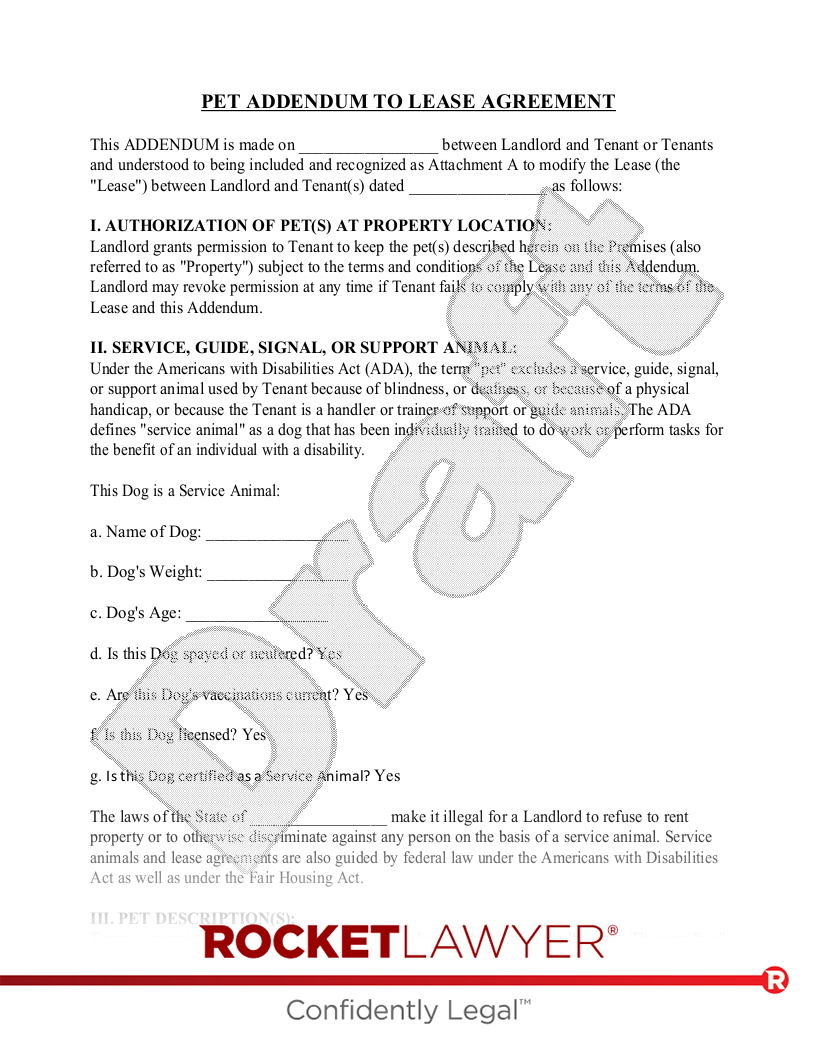Which types of pet deposits, rent, and additional fees can I collect from tenants?
Additional deposits for pets and non-refundable pet fees are prohibited in some states, while pet rent (specifically, an additional monthly amount) is generally allowed in all states.
Many states limit the total amount you may charge for a rental deposit, in which case you may require an additional pet deposit as long as it doesn't exceed this limit. In California, for example, landlords may require a total deposit of up to two months rent for unfurnished rentals and up to three months rent if they're furnished. Other states specifically allow for an additional pet deposit, which doesn't factor into limits set for general security deposits.
If non-refundable pet fees are not allowed in your state, then make sure your rent and security deposit amounts accurately reflect any additional costs you may incur from allowing pets. Pet deposits range from $100 to $300, but are generally proportional to the overall rent in your particular region.
How much should I charge for pet rent?
Pet rent typically ranges from $10 to $50 per pet, per month, depending on the type of animal. The key is to charge enough pet rent to account for the additional wear and tear (short of actual damage) that may result from having a pet, while being reasonable. If it's a renter's market, you'll also want to remain competitive with other landlords. Allowing pets will create additional demand for your rental property.
Do I have to refund pet deposits?
While some states do allow non-refundable pet fees as a condition of having a pet in your rental, make sure you differentiate these fees from the deposit. Just like any other rental deposit (and in accordance with state laws governing how these funds must be held), a pet deposit must be refunded minus any expenses for pet-related repairs or cleaning.
However, it's best to protect yourself and avoid disputes by detailing how any of the funds were spent when you return the balance of the deposit. This may include photographs documenting instances of damage or soiling caused by the pet, an itemized list of what was done to repair the damage, and amounts spent to fix or clean the rental unit.
Does a pet deposit have to be used only for pet-related damage?
It depends on your state or local law, and the language in your Lease Agreement. In some cases, you may be unable to use a pet deposit to cover damage that was not caused by the animal. It generally depends on whether the pet deposit is held separately, or whether it simply becomes part of the tenant's security deposit for the entire rental. If you plan on including it as part of the overall security deposit, you may want to confirm your state or local laws allow this.
Can I request a pet deposit for a service animal?
Generally, no. Federal law prohibits landlords from requiring tenants with service animals to pay any additional rent or deposit. This is because service animals are not pets. A landlord may charge a reasonable fee for any damage done by a service animal, as they would for damage done by the tenant. They also may move to evict a tenant with a service animal that is improperly trained and causing problems on the premises.
While you may not ask a prospective tenant about their medical diagnosis, you may ask how a service animal is specifically trained to assist, as well as request proof that the service animal is indeed recommended by a medical professional. Individuals with service animals may expect this request and may have the necessary paperwork readily available.
How do I protect my investment?
There's a lot to think about when renting to pet owners. Consider having prospective tenants with pets fill out a Pet Application Form as part of the screening process. You'll also want to put all pet-related rules and regulations in writing, preferably with a Pet Addendum that you add to the Rental Agreement.
Since most renters have (or would like) pets, it may be in your best interest as a landlord to welcome them onto your property. While you don't have to allow all pets, you do need to be prepared for the worst. This includes charging appropriate pet fees, rent, and deposits that cover your risk and comply with state law, or your insurance carrier's requirements.
If you have more questions about allowing pets in your rentals, service animals, or other rental property matters, reach out to a Rocket Lawyer network attorney for affordable legal advice.
This article contains general legal information and does not contain legal advice. Rocket Lawyer is not a law firm or a substitute for an attorney or law firm. The law is complex and changes often. For legal advice, please ask a lawyer.
